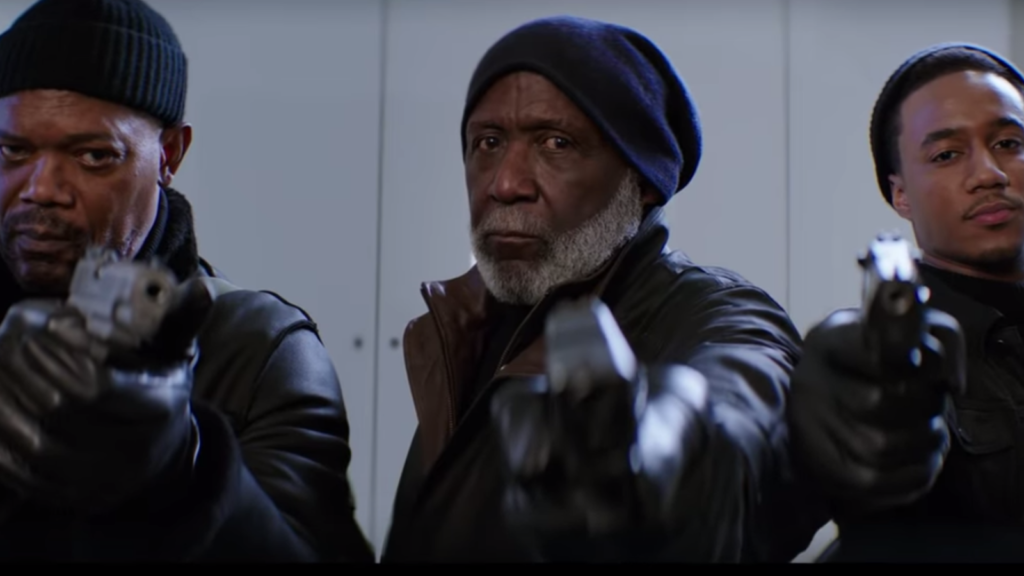Shaft (2019)

Not to get too confusing, but the 2019 version of Shaft is actually a sequel to the John Singleton’s 2000 version, Shaft, and, due to the appearance of Richard Roundtree, we find that both of these versions of Shaft are now sequels to the Gordon Parks’ 1971 original, Shaft. Each version introduces us to a new generation of John Shaft, and in this new film, we get John Shaft Jr. (also called J.J., which is how I’ll refer to him in the rest of this review in order to avoid confusion). J.J., we learn from this retcon, was born several years before the events we see in 2000’s version of Shaft, fathered by Samuel L. Jackson’s Shaft (which is how I’ll refer to this character throughout), who was immediately estranged from his kid by the mother, Maya, who wants to keep her child’s life from the daily danger that Shaft is surrounded by. Shaft keeps his toe in the water with J.J. by sending presents on birthdays and holidays that often show how out of touch he is, not only in what’s going on in J.J.’s life but also in what is acceptable by standards of our less politically incorrect world.
J.J. Shaft works primarily as a desk jockey in the FBI. J.J. learns that his old friend and sometimes protector died from an overdose in Harlem. Knowing that his friend had turned his life around, J.J. thinks the death smells funny and decides to investigate the cause, leading him to ask questions in a drug dealer’s lair that gets him nearly killed. Desperate to move on with his investigation, J.J. reaches out to the father he never knew, currently working as a hardboiled private investigator in town, who readily accepts his role as his son’s new protector and mentor of all things “manly”. They soon discover there is, of course, far more involved in Karim’s death than what the official report says, and soon the men find themselves in the middle of a murder case.
Shaft is a decided departure for the series thus far, as it plays more like a broad semi-spoof of the action-thriller franchise. Intentionally so, as the makers of the film bring in Tim Story to direct, who, after two semi-sophomoric attempts at delivering a Fantastic Four franchise, has primarily become known for his comedies usually featuring African-Americans in lead roles, like Barbershop, the Think Like a Man series, and the Ride Along series. As such, the character that was once grounded and rounded in Richard Roundtree’s heyday is now relegated to becoming a stereotype of the epitome of badassery, with the O.G. Shaft (O.G. is how I’ll refer to Roundtree for this review, who doesn’t make an appearance until very late into the film) concentrated machismo, his son Shaft a chip off the old block but with more playful charisma (note: in the 2000 film, Jackson’s character was O.G.’s nephew; we learn here he was just pretending to be his uncle out of disdain), and J.J. almost wholly devoid of anything that would make his pop and granddad think he wasn’t castrated by the expectations of courteousness and respect for race and gender equality within the modern generation.
While the original Shaft helped popularize a whole subgenre of Hollywood cinema for years, 2019’s version only sees its predecessor for its differences than its similarities, choosing to use the comparisons of attitudes in the 1970s to those of the 2010s for laughs, mostly to suggest that, while the older Shaft men might seem like relics (there are only six years age difference between the actors playing the older two Shafts, so there is a very good reason why they seem of the same generation in attitude), they’re far more preferable to the new version of Shaft in J.J., who is neither lover nor fighter, and needs to “man up”. This theme is evidenced when J.J. does manage to show how he can use a gun to blast through some bad guys, and this open display of violence is what ultimately gets the girl to notice him as more than a friend in the end.
While it delivers on laughs and ample low-wattage entertainment, if there is an element of Shaft that produces lulls, it’s in the plot itself. It’s not only predictable to see where things will go once elements are introduced, but it is also tedious to hear the men discussing aspects of the plot as they’re putting together the clues of the case. The comedy scores more points by ignoring it, yet being a film featuring law enforcement and detective types, the ugly-headed plot can’t quite be avoided, unfortunately. Contrary to what Isaac Hayes sang nearly fifty years ago, 2019s Shaft is the cat that does cop out when there’s danger all about.
Shaft is perhaps too much of a departure in tone from the original Roundtree films, and even the previous Jackson film, to qualify it with a recommendation for series fans, per se. However, lovers of action-comedies, especially ones that explore jokes about the cultural divides and attitudes among various generations of men, will likely find enough laughs and decent action to sate their quest for entertainment in a modest fashion. The performances by Usher and Jackson make for some good comedy interplay, as well as a game supporting cast. For those looking for a return to its original form in exploring the trials and tribulations of a Black man trying to do what’s right in a world that’s doing much more wrong, 2019’s Shaft will likely give you the shaft.
Qwipster’s rating: B-
MPAA Rated: R for pervasive language, violence, sexual content, some drug material, and brief nudity
Running Time: 111 min.
Cast: Samuel L. Jackson, Jessie T. Usher, Regina Hall, Alexandra Shipp, Richard Roundtree, Titus Welliver, Matt Lauria, Method Man, Avan Jogia
Director: Tim Story
Screenplay: Kenya Barris, Alex Barnow
